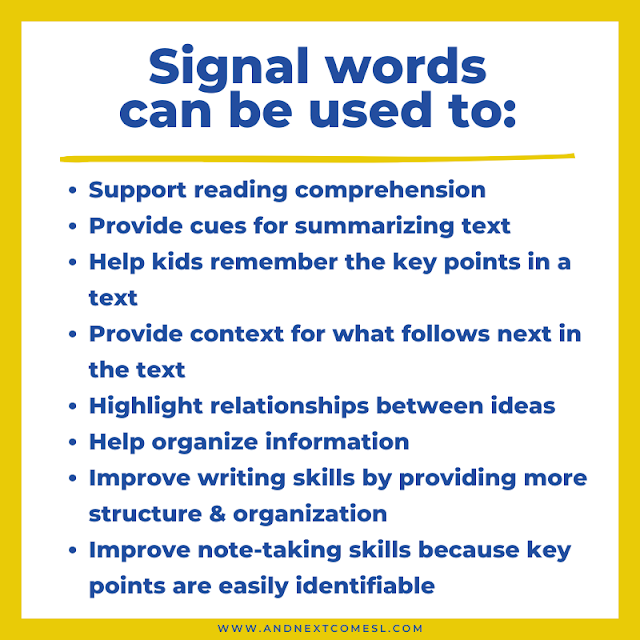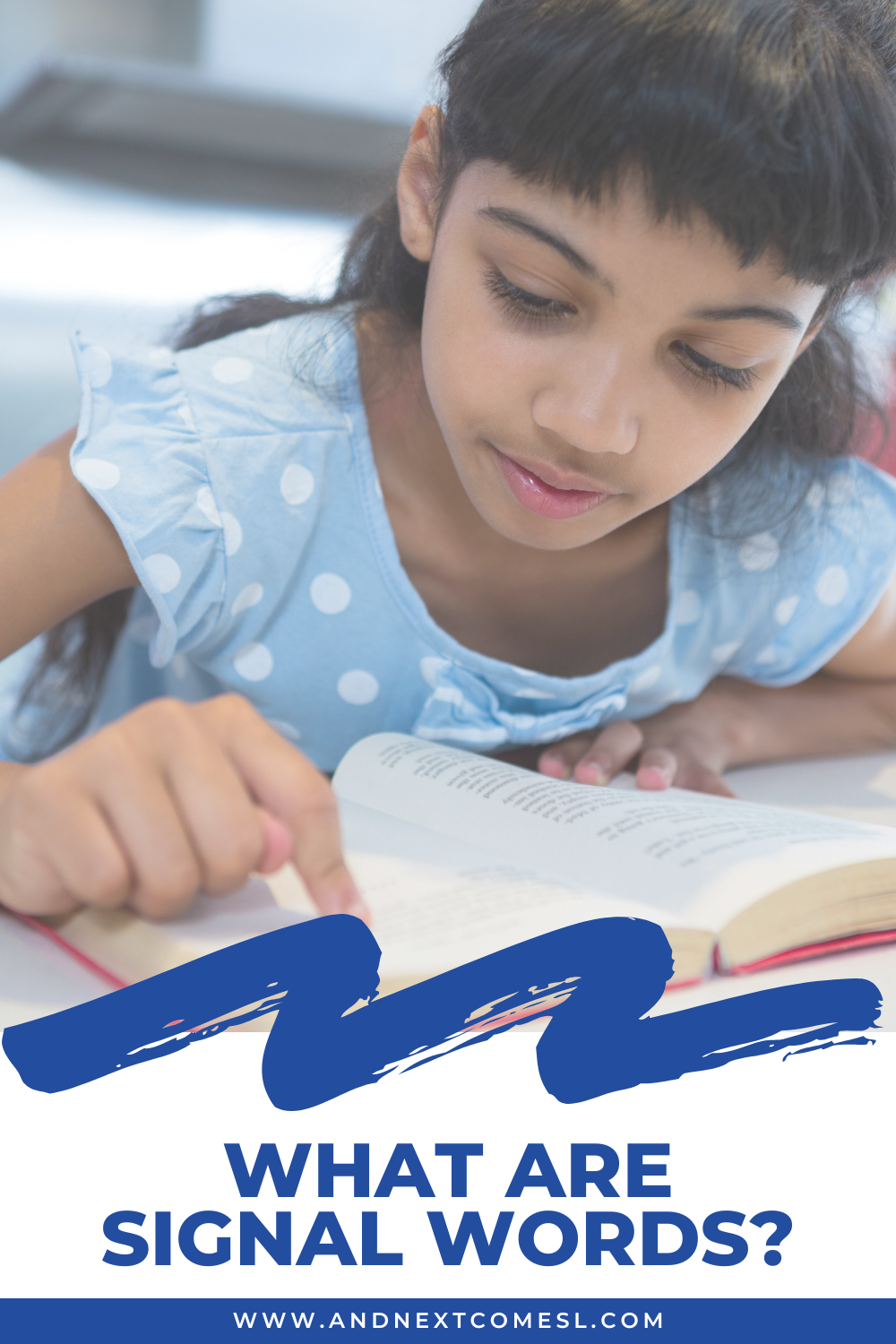Given that comprehension challenges are common amongst hyperlexic learners, it's important to prioritize and support comprehension from a young age. That includes explicitly teaching them different comprehension strategies and using visual supports to do so.
One strategy that can be particularly helpful is to teach them about signal words or key words or phrases that can help boost understanding of a text. (Although you can use these signal words to help writing writing assignments too!)
But what are signal words? Why are they important? And how do you use signal words at home or in the classroom? Well, that's what we'll cover below.
You'll also find a free printable list of signal words because visual supports are so important to use with hyperlexic readers.
So...What are Signal Words?
Signal words are specific key words or phrases in a text that give you clues or hints about what is going to happen next, the structure of the text, and/or the relationships between ideas.
These signal words are used to show cause and effect, compare and contrast ideas, help us determine fact from opinion, show a specific sequence, allow us to transition to a new idea, and more.
We'll go through specific examples in a bit, but, in the meantime, let's take a closer look at the benefits of signal words and why we want to use them.
Why are Signal Words Important? A Look at the Benefits
First of all, signal words can boost comprehension and understanding of a text. Something that is incredibly important if you have a hyperlexic learner, given their difficulties with comprehension.
By the way, signal words can also help with understanding math word problems, especially if you know what math signal words to watch out for.
You can also use signal words to help with writing assignments. Another area that many hyperlexic learners need support with too (learn more here). After all, using signal words can give kids a bit more structure for communicating their ideas.
Here's a more detailed list of why signal words can be important for all learners, not just hyperlexic ones:
- Supports reading comprehension
- Provides cues for summarizing text
- Helps kids remember the key points in a text
- Provides context for what follows next in the text
- Highlights relationships between ideas
- Helps organize information
- Improves writing skills by providing more structure and organization
- Improves note-taking skills because key points are easily identifiable
How to Use Signal Words for Reading, Comprehension, &/or Writing
Okay, signal words seem important for both reading and writing, but how do you use them exactly?
Well, let's imagine you are reading a story with your child. While reading, you can point out the signal words that you see and explain their meaning. That might mean explaining that the word "because" tells us why something happened or that the phrase "the next day" tells us that we're reading about a sequence of events.
You can also use signal words to help with summarizing or retelling a story. For instance, you might summarize a story like so: First, the girl did this. Then, this event happened. Next, she did this. Then finally, she did this to solve the problem. It's similar to using something like this somebody wanted but so then graphic organizer.
Another idea is to do a signal word scavenger hunt. Before reading, quickly scan the text and point out or highlight any signal words that you spot. Do the words seem to be related to an opinion or are they showing a sequence of events? Do the words seem to be more factual in nature or are they comparing something? A quick glance through the words can usually give you an idea of the text before you read it closely.
How about for writing though?
Well, you can use signal words to format and organize your ideas that you are going to write about. Let's say you're writing an opinion piece. You can start off with a signal phrase such as "I believe" and then follow it up with "one reason" or "another reason." Or let's imagine you are writing a short story. You could rely on sequence words like first, next, then, and finally to sequence the events of the story.
You probably remember being taught this type of method for writing back when you were in school...
Now that you know what signal words are, why they're important, and how to use them, let's take a look at some of the actual key words to watch out for. There's also a free resource that you'll want to print off and keep handy.
It is worth noting, though, that some signal words can indicate more than one type of relationship. For example, a word like "also" could signal that a comparison is happening, but it could also highlight part of a sequence or that something is being described in more detail. So it's important to look for multiple key words in a text to help narrow things down.
And, obviously, these lists are not-exhaustive. There are lots of other example signal words that you can look out for, which is why there's lots of empty space to write your own on the free cards.
Words that Signal Compare & Contrast
Sometimes a writer wants to show how some things are the same or different. Maybe something is bigger or wider. Maybe two items use the same materials or are similar in shape. Whatever it is, the following list of words can indicate that two or more ideas or items are being compared and contrasted.
- Same
- Also
- Like
- Both
- Alike
- Similar
- Similarly
- As well as
- More
- Less
- Different
- Difference
- But
- Unlike
- However
- While
- On the other hand
- In contrast
- Compared to
Sequencing Signal Words
Sometimes there are key words or phrases that tell the specific order of events or give you a better idea of the structure of the text. For instance, here's the first reason why you should do something and here's the next one. And finally, here's the last one. That kind of idea. Either way, you can learn a lot about the sequence of the text by looking out for the following words.
- First
- To begin
- In the beginning
- It all began
- To start with
- One day
- Next
- Secondly
- Afterwards
- After a while
- Later that day
- Suddenly
- Then
- Also
- Additionally
- All of a sudden
- The next day
- Last
- At last
- Finally
- Eventually
- In conclusion
- After that
Signal Words for Facts
It's important to be able to tell the difference between a fact and an opinion in a text. In order to spot facts in particular, you can look for mentions of specific numbers, names, places, dates, and times. Or watch out for any of these signal words.
- Numbers
- Names
- Places
- Dates
- Times
- The fact that
- In fact
- Indeed
- The truth is
- As a matter of fact
- It is proven
- True
Signal Words for Opinions
There are also lots of clues you can look for when it comes to whether something's an opinion or not. Just look for one of these example signal words.
- Think
- Believe
- In my opinion
- Best
- Worst
- Favorite
- Good
- Bad
- Love
- Hate
- Probably
- Should
- Hard
- Easy
- Greatest
- Seems
- I am convinced
- I am confident that
- Prefer
- Guess
- Point of view
- Interpretation
- I'm sure that
- It's likely that
Signal Words for Problem & Solution
Sometimes you need to be able to identify the problem and solution in a text, but how do you do that? Well, you look for words like these that can indicate whether something is a problem or solution.
- Fortunately
- Unfortunately
- Therefore
- Trouble
- Problem
- Issue
- Challenge
- Answer
- Solution
- Conclusion
- Solve this
- One reason
- Recommendations
- Possible
- Result
- Resolved
- Perhaps
- Could be
- Conflict
Signal Words for Descriptions & Details
There are also lots of words that can be used as evidence to support things like a fact or an opinion. And that's where these signal words for descriptions and details come in handy. Keep your eyes open for the following words that can indicate that something is being described in more detail.
- For example
- For instance
- In addition
- Also
- Too
- Some
- Most
- All
- Other
- Means
- Specifically
- Such as
- Furthermore
- Characteristics
- Appears to be
Cause & Effect Signal Words
Sometimes ideas in a text are related in a causal relationship. Not sure if they are or not? Well, looking for the following words can help you determine what is the cause and what is the effect.
- Because
- Since
- If...then...
- Due to
- So
- Therefore
- Thus
- As a result
- Consequently
- In order to
Download the Free Printable Signal Words Cards
This two page printable contains 8 cards, including a cover page and 7 cards with the above signal words.
















